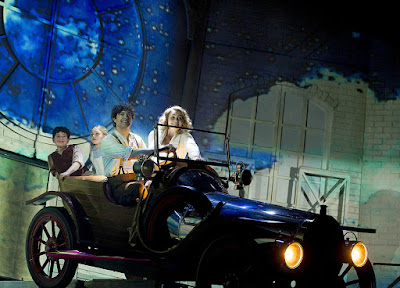Palace Theatre, London
*****
Based on an original new story by J.K. Rowling, Jack Thorne and John Tiffany
Written by Jack Thorne
Directed by John Tiffany
*****
Based on an original new story by J.K. Rowling, Jack Thorne and John Tiffany
Written by Jack Thorne
Directed by John Tiffany
 |
| Jamie Parker |
Translating Harry Potter from page to stage is a task so immense that it almost requires wizardry itself. In her books J.K. Rowling has written with such detail that the reader can picture the action as vividly as the imagination will allow. Similarly and alongside, in the movies' post production suites clever editing combined with digital technology has brought almost anything to life. So, could a stage presentation of the latest episode(s) of the Harry Potter series match the buzz of the books or the hype and hysteria that has surrounded the much loved movies?
The answer is most definitely Yes.
The success of Harry Potter and The Cursed Child lies not just with its excellent cast, but rather with its creative team and writers. From the outset, both parts of this gargantuan production constantly reference and revisit the series' previous books, yet all the while pulling off a magnificent coup by moving forward with a spellbinding script that actually demands no prior Potter knowledge at all.
Notwithstanding that any Harry Potter story is going to demand spectacular trickery, the real magic here lies with the basics, with Steven Hoggett’s movement direction proving as slick as any of the on-stage illusions. Hoggett’s choreography - alongside Imogen Heap's music - not only sets the scenes but also captures the atmosphere of locations such as Hogwarts School where the majority of the play is set.
John Tiffany seamlessly stitches together state of the art effects alongside traditional top-notch stagecraft. While all the expected illusions and gimmicks are here, everything goes one step further than expected. Flying, floating and transforming all take place before the eyes of the audience, at times even filling the auditorium, but the sucker punch is delivered on stage by the cast. Carving out intimate moments on stage, Tiffany allows us to meet the characters - some more familiar than others - but each nonetheless given time to establish their relationships with each other.
Amongst hard core fans in the audience some revelations may cause gasps of shock and surprise but again, previous knowledge is far from a necessity. Picking up the Potter legacy nineteen years from where the story left off, Jamie Parker's Harry, Norma Dumezweni as Hermione and Paul Thornley's Ron are all adults now. Jack Thorne's writing ensures that each of the three bring their character's classic traits and tributes from the books to their own performance, while more than putting their own stamp firmly on their respective roles.
Parker’s take on the relationship between Harry Potter and his two sons is particularly moving. Tom Milligan plays James Potter the mad, eccentric big brother to Albus Potter played by Sam Clemmett. The play sets off with the two brothers on their way to Hogwarts. James settles in well and is proud of his father’s name at the school. Albus' time at Hogwarts is more challenging and through the various twists and turns of his struggles, the relationship between father and son becomes even more strained. Parker and Clemmett rise to the roles with raw and emotive performances from both actors.
Building a set that comes close to some of the great Rowling tableaux was never going to be easy but Christine Jones' tall gothic arches create the Potter world perfectly. Bookcases swivel to become mazes, as staircases twist and turn transforming settings, all enhanced by Neil Austin's ingenious lighting designs.
When the Potter books were first published there was acclaim for J.K. Rowling, not just for having penned a damn good yarn, but for having almost single-handedly reintroduced reading to a generation. And as this review is published, bookstore queues are stretching around the block for the play's script, released today as the 8th title in the series. It would be wonderful if when the play transfers globally, as it surely will, that it may also take introduce the inspirational experience of live dramatic theatre to a new generation too.
Harry Potter and The Cursed Child is a spectacular play - and it should remain a source of much pride to Sonia Friedman, Rowling and the show's entire cast and crew that such epic theatre has been developed and premiered in London's West End.
Booking until December 2017
Review by Joe Sharpe
Photo credit Manuel Harlan














